[Increase Search Traffic By 119%]
Why Google Favors SSL Sites
In this in-depth article, I’ll show you exactly how to grow your search traffic by 119% or more.
You need a thick skin to rank a real estate website in Google top 10. Don’t have the time? Get a free consultation with ScottKeeverSEO team. We can help!
Of those who bought houses, 87% of them purchased their homes through a real estate agent or broker.
To give your real estate business the best chance of gaining customers, you need to target the hundreds or thousands of people in your city looking for a house today.

Not doing so means you’re leaving money on the table. Or worse, putting money in your competitors’ pockets.
Google is the #1 source of traffic and leads for real estate companies. Among home buyers in the last 12 months, 51% of them found their homes on the internet while 30% found it through a real estate agent.
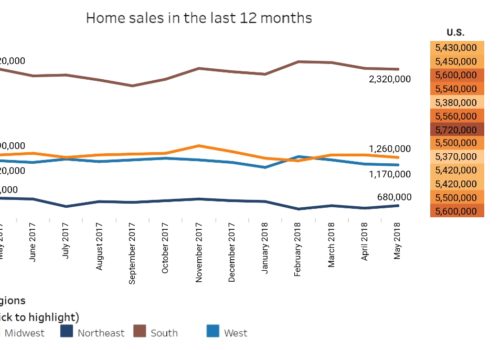
It’s not easy but it’s doable. When I first started working with real estate agents and companies to improve their website’s visibility online, while discussing with a prospective client over coffee, he asked me this question:
“How do I attract potential clients to my real estate business when there are heavy giants like Zillow, Trulia, and Realtor.com showing up for virtually every high-volume keyword in Google?”
Here’s my response:
“You know what? It’s tough but don’t let that stop you. There are 3 billion new searches in Google every day. The opportunities to rank and drive significant traffic are huge.”
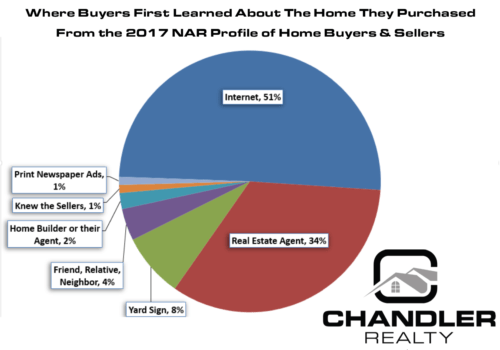
We both agreed it’s not going to be easy. Yes, the level of competition in this industry is high. Houses are being sold and rented each day. When homeowners are looking to sell their houses, how will they find your company?
According to data from the National Association of Realtors (NAR), 5.51 million existing houses were sold in 2017. The US Department of Housing and Urban Development estimates that 629,000 newly built homes have been sold in the past year.
If you can get your web pages to show up in Google for its relevant keywords, you’ll drive a lot of interested home buyers and sellers to your business, especially those in your locality.
Search engines like Google send the most targeted clients to service-based businesses. These clients will not only buy from or sell to you, but they’ll also refer others your way. In fact, 89% of buyers would buy from an agent again or recommend them to others.
Here are proven techniques you can start using today:
Are you excited already? Well, I wrote this comprehensive guide with you in mind. I’m aware that you might be having challenges ranking in Google or generating search traffic to your real estate website.
I’m here to help you. Do you have any questions? Get a free consultation with us, we’ll listen to you.
1. Target The Right Local Keywords
One of the ranking factors for local searches is the keywords in your content. When a potential buyer enters a keyword into search engines, your website is more likely to rank for it if the page is well-optimized for it.
Here’s an example: when I enter “real estate agent in San Diego,” take a look at the websites that pop up. Is your website there? If your business isn’t based in San Diego, replace it with your city and check again.
Your website is supposed to appear in either Google Map pack or the organic listings or both. If you can’t find your website here, it means your site isn’t optimized for search engine.
A successful real estate SEO strategy has two major major keyword components:
i) Location
Your keywords should include your location as many people looking for a realtor, a house to buy or intends to sell their houses will include their location in the search engine to get relevant results. Your location could be your city.
Top Realtors in Michigan
Real estate Laurel, Maryland
Houston TX real estate agent
Homes for sale in DC.
Real estate Laurel, Maryland
Houston TX real estate agent
Homes for sale in DC.
However, if you operate in a large city, say New York, you should also include the name of your area. This could also include “near me” as many people use that in local searches.

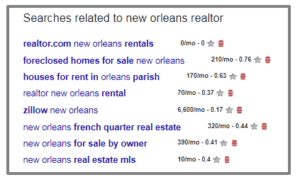
ii) Real estate Keywords
What search terms are people using in the search? Is it “real estate”? Or “buy homes”? Or “realtor”?
You need to use the specific terms that buyers and sellers are already using to find information on Google search.
If you’re a realtor in New Orleans, for example, you can target one or a handful of these related keywords on your website/page.
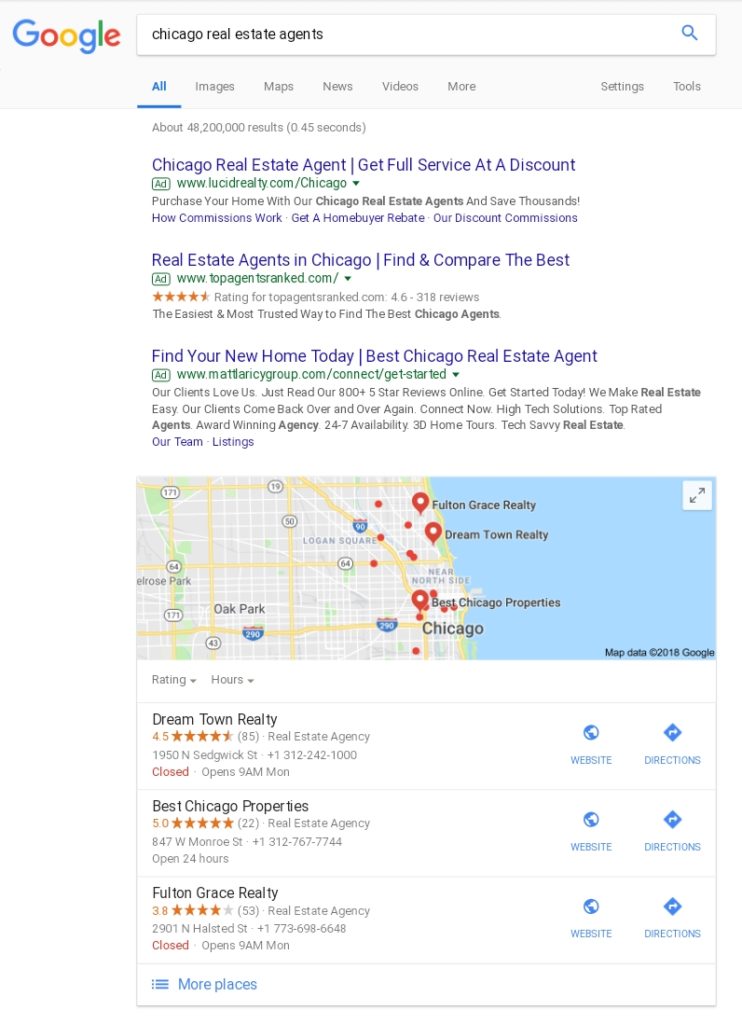
See this suggested pattern for keywords you can use on your real estate website:
[city] + real estate listings
[city] + homes for sale
[city] + realtors
Real estate agents near me
Homes for sale near me
That’s exactly what potential clients (home buyers and home sellers) want. Hence, Google ranks real estate sites that target such terms.
However, these suggestions are not the only terms potential clients when looking for information on Google.
To find more keywords to target in your content pages, you should conduct a keyword research. There are several tools you can use such as Google Keywords Planner, SEMRush, Ahrefs, KeywordTool.io, Ubersuggest, Long-Tail Pro.
Let’s do a quick research using the KeywordTool.io tool. Simply visit the website and enter your target keyword (e.g., Chicago real estate agents). The tool will suggest other variations of the primary keyword or related keywords.
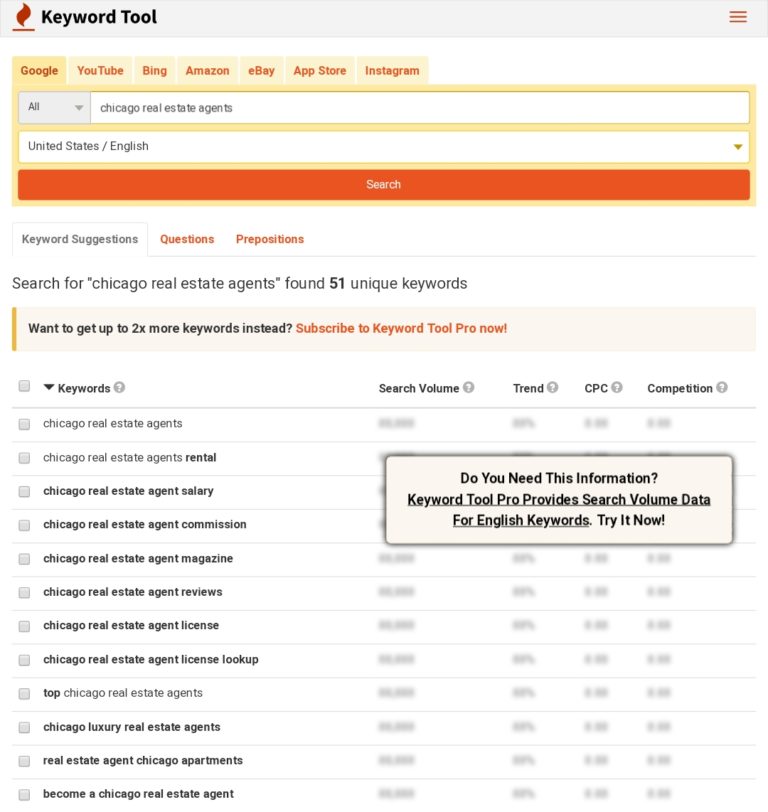
To complete your basic keyword research, you can also use Ubersuggest which is a free tool. This tool gives you more information about your keyword. You can see the average number of monthly searches for that term, which is the search volume.
You can also see the level of competition. The key is finding suitable keywords with decent search volumes (1,000 or more) per month and low competition.
Other information you’ll find is the list of similar keywords and the websites currently ranking for that term.
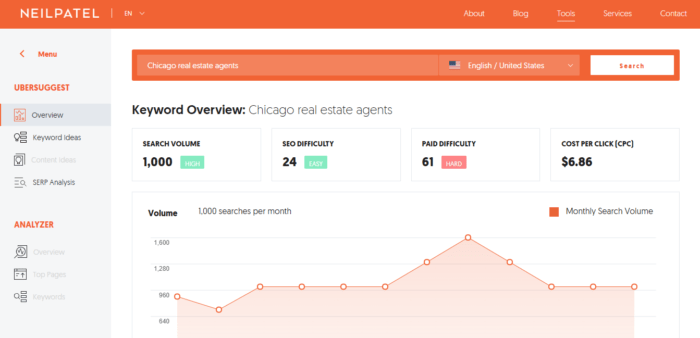

Using the right keywords could be the difference between gaining and losing a customer.
While implementing keywords on your website, it’s vital that you don’t over-optimize your pages. In simple terms, don’t try to repeat your keywords several times on the page or mention it when it’s irrelevant or unnatural.
Keyword over-optimization could get your website penalized by Google. Ultimately, your content must be useful, easy to scan, and helpful. Talking about content, let’s discuss it.
Better yet, our team at Scott KeeverSEO can guide you on the right type of content to create so you don’t waste your time and money. Book a free consultation today.

If you want more details, keyword tools like SEMrush and Ahrefs can show you the keywords your competitors are ranking for.
In fact, you can enter any of these top 5 most popular websites that link to U.S. real estate firms. Check the keywords they’re ranking for, and target the once with a low KD (keyword difficulty) score.
According to Google’s Search quality analyst, Andrey Lipattsev, content, along with backlinks and Rankbrain, are the 3 most important ranking factors.
“Quality content” is being thrown around on the web. But what does quality content mean?
It depends.
What is deemed ‘quality content’ for an academic website is different from that of a real estate website.
For a better understanding, quality content is a piece of content that meets your visitors’ needs. It tells your story, hooks the audience, and builds trust.
2. Create Useful Content
Is your content useful?
If Google’s head of Search walks up to you and requests for your best content that should rank at #1 today, can you present it?
If you’re doubtful, then it’s obvious that your content doesn’t cut the mark. To rank your website higher in the search engine results pages (SERPs), both users and Google want you to create awesome content — content that solves user’s questions.


According to 2016 profile of home buyers and sellers by NAR, 86% of recent buyers found online websites as a very useful information source.
So what’s the component of “quality content” for a real estate website?
First and foremost, you need to add a blog to your real estate website. This serves as a platform to post regular information that will help your audience.
To your potential client, they’ll appreciate all of these content archetypes on your blog:

i) A detailed information about properties: When visitors come to your website, they want to see enough information about the location, cost, number of bedrooms, and other important details. 85% of buyers found detailed information about properties for sale very useful.
ii). Photos: Visitors want to see images of different parts of your listings. This helps a potential buyer to see if the property suits their needs. 89% of buyers found photos of properties for sale very useful during the purchase process.
iii). Neighborhood information: Prospective home buyers or renters want to know more about the neighborhood as this affects their lives and lifestyle.
iv). Interactive maps: With this on your site, buyers can easily locate homes they’re looking to buy in the city.
v). Testimonials: Praises from people who have bought homes from you in the past, for example, is a good step to attract more buyers as this serves as social proof.
vi). Mortgage/financial calculator: This helps potential buyers to determine if they’re financially capable of buying a home.
vii). Content about buying and selling homes: Not everybody looking to buy a home knows so much about the buying and selling process — especially first-time buyers.
Thus, providing this information will get them engaged with your website. And who knows, they may decide to check your listings or even contact you directly.
Content Length Matters To Google
How comprehensive should your content be? Well, Google recommends as long as necessary. For instance, the content on a real estate listing page will usually be shorter than a guide on how to find a realtor or find the home of your dreams.
serpIQ, in an experiment, found that the average top 10 results on Google first page contain at least 2,000 words. To increase your chances, add more value to your content and increase the word counts to 3,000 or more.
In fact, the more detailed and useful your content is, the higher the chance of gaining more quality backlinks from other trusted real estate sites, according to a study by HubSpot.
Don’t get me wrong. I’m not suggesting you should add fillers just to increase word count. That will not help your rankings.
The experiment above only shows a correlation and by no means causation. The most important rule is providing the necessary knowledge or solving a potential buyer’s problem in the number of words necessary.
For the best approach to creating useful and detailed content, you need to know your audience. This might sound basic, but it’s useful. So how do you know your potential clients when you’re just starting out? See the next line…
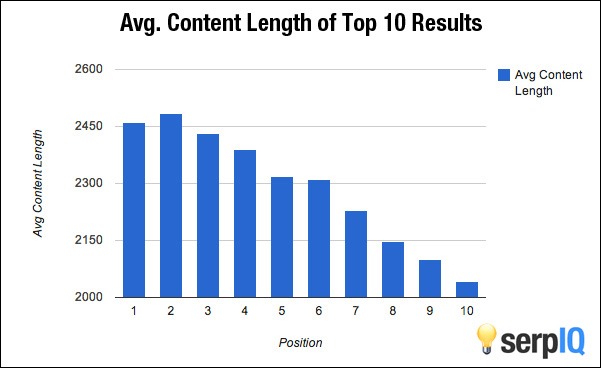
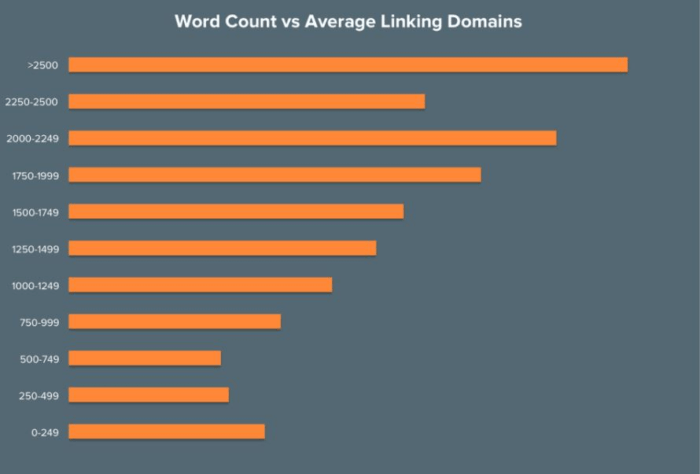
3. Create A Buyer Persona
To speak the language that your prospective client will understand, you need to know a lot about them. Ask yourself this questions:
- Who is my ideal client/customer?
- What’s their age bracket?
- What’s their primary challenge?
- What’s their annual income?
And so on.
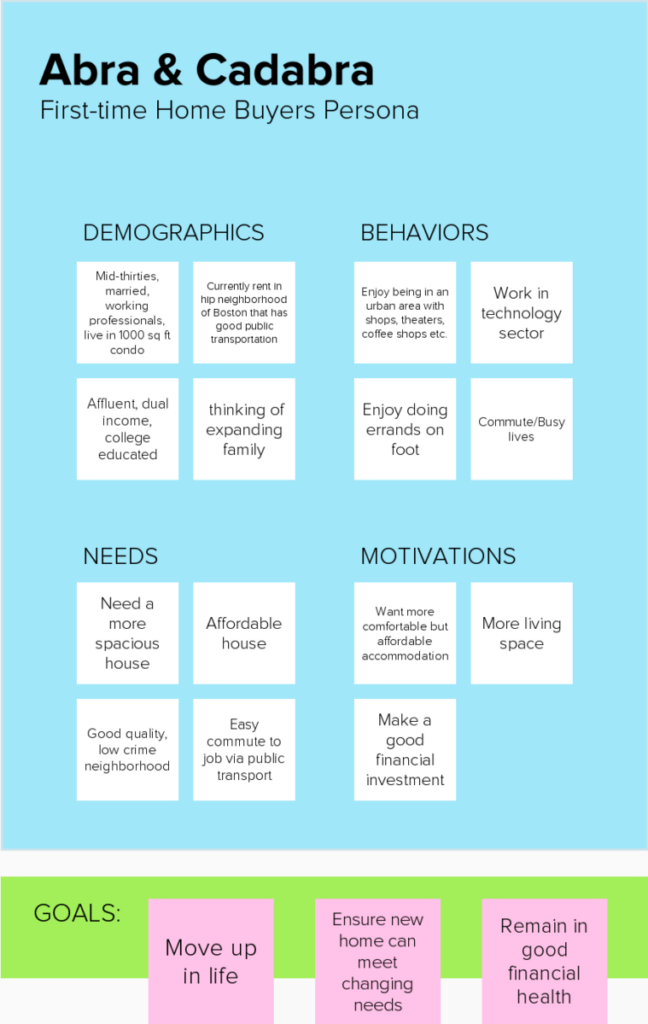
A buyer persona is a document where you profile ideal customer. This informs your content strategy and the eventual marketing strategies and channel to use.
It looks similar to this:
To be more specific to our topic, here’s an example of a Home Buyer’s persona:
You can research and create your content to address your buyer’s profile.
For example, if during your buyer personal mapping you discovered that your prospective client is tired of looking for a new home to buy, you can incorporate that into your content. How cool is that?
Does it work? Of course, it does!
By creating quality content that truly helps the target audience, and using other marketing strategies to promote it, 904living.com increased its ranking for local real estate keywords and organic traffic grew by 49.45%.
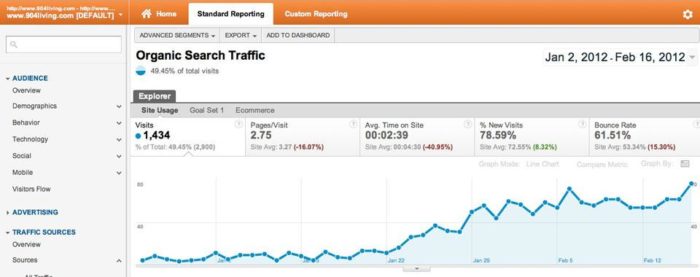
4. Internal Linking
When search engine bots crawl your website, internal links helps for easy navigation from one page to another.
Also, linking to your inner pages that treat other topics related to real estate will further signal Google search that your website is a resource on that topic.
This gives you a better authority on that topic and helps your website to rank for keywords on that topic.
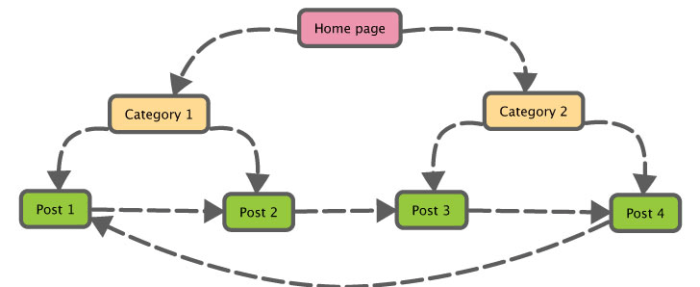
Internal links help to reduce bounce rate on your pages as visitors can click-through to other pages on the same domain. This is a positive signal to search engines — and it can only improve your search visibility.
By linking to internal pages and using other strategies, Crystal Tost recorded 33,974 pageviews from search engines.
The site also ranked in Google local map pack in Calgary for important local keywords.
5. Build Trusted Links To Your Website
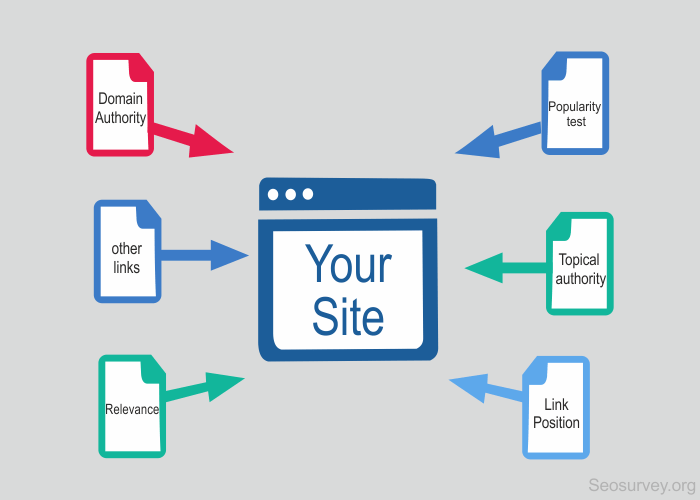
Backlinks (or inbound links) are links from other websites that point to your own website. Links are among the 3 most important search ranking signals. backlink carries a lot of power because it’s a sign of trust in your website from other websites.
Unfortunately, gaining backlinks is difficult. Most real estate companies get tired in the process and quit. Others hire link builders who use blackhat (unfriendly) techniques to gain backlinks.
Google is out for these types of links. A penalty is usually the consequence.
The right types of links from trusted neighborhood domains will completely push your site to the top of the search engines. Yes, we’ve been building whitehat links to our clients’ websites for years and the results are plain for all to see.
For local SEO, links from local websites increase your website’s authority in that target location.
For example, if you want to rank higher and attract clients in New Jersey, then getting backlinks from local directories, blogs, and media sites hosted in that location or its environs will be helpful.
To your potential client, they’ll appreciate all of these content archetypes on your blog:


There are many ways to gain the right backlinks to your real estate website:
a). Guest Posting: This involves writing posts related to real estate for other relevant blogs in your industry. This establishes you as an authority in the industry.
It can drive traffic to your website (and help you attract potential home buyers or sellers), and you also get a natural link that will improve your search performance. It offers enormous benefits.
When you’re ready to begin, here’s a list of real estate blogs that accept guest posts.
b). Host or attend local events: Hosting or attending local events is an opportunity to meet people. Some of them will be website owners, journalists, or even potential buyers.
Building relationships and telling people about your business can get you mentioned on local websites and backlinks to your website.
c). Tracking mentions: Did a website mention your business or brand without linking to your website? You can contact the webmaster of the website to link to your website.
d). Answer questions on online discussion boards: Answering questions related to real estate on forums helps to position you as an authority. And if you have a post on your website that answers the question better, you can link to it.
e). Produce helpful content consistently: When you produce content that serves as a resource on a topic, other websites will be more likely to link to it as it will help their audience.
By building a link profile for a real estate website, a real estate company increased organic traffic by 93.91%. Added to this, they improved leads acquisition by 191.6% 3X their monthly income from search traffic.
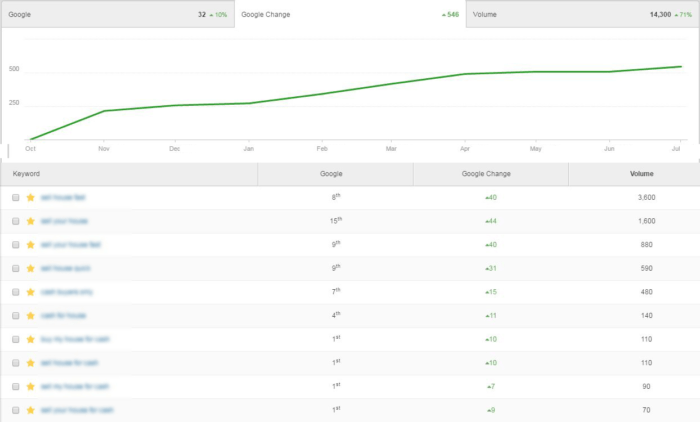
6. Claim Your Business On Google My Business Page

For many local keywords, Google tends to serve 3 organic results in the local map pack first.
Listing your business and claiming it on Google My Business page allows you to register your business name, address, and phone number (NAP) with Google.
In addition, you can add images of your business location and home buyers can add ratings and reviews about your business.
To get started, visit the Google My Business page and click on “Start Now” button.
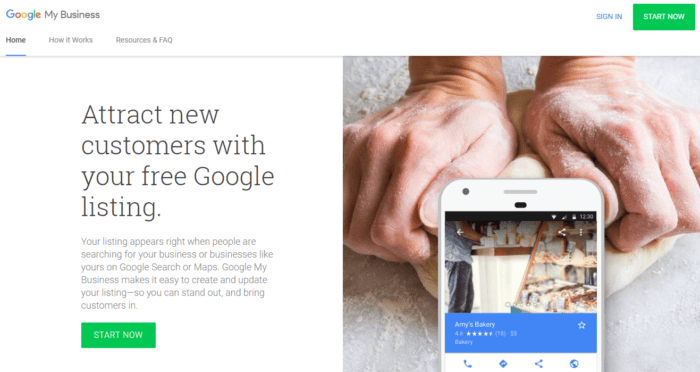
You can fill in the necessary details about your business/website.
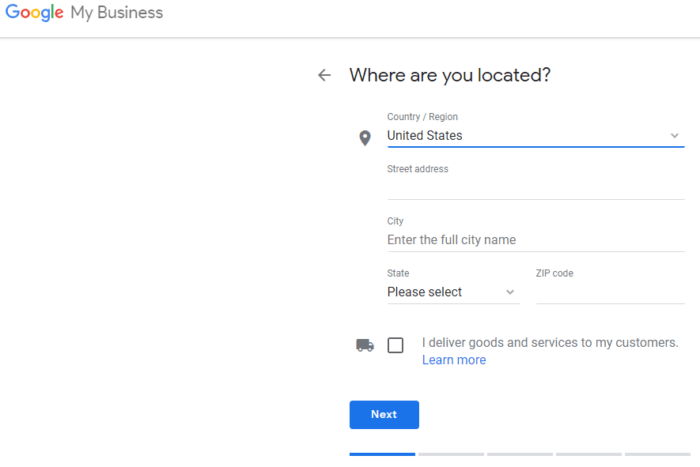
To complete your free registration, you’re required to verify your listing. Google gives you different options to verify your page.
Verification allows you to have full control of your business in the local map packs so that you can attract potential clients who search Google using “near me” keywords such as realtor near me, real estate agent near me, apartment for rent near me, etc.
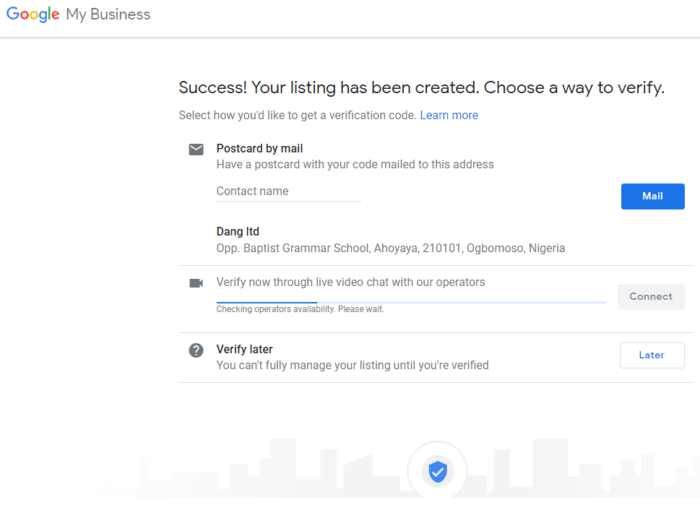
7. Add Your Business To Local Directories
To appear in the Google local 3-pack for relevant real estate keywords, your business needs to be in the local directories. This gives you local citations which Google uses to gauge the relevancy of your business.
In a recent study, BrightLocal found that businesses that show up in the top 3 local map pack have an average of 85 local citations.
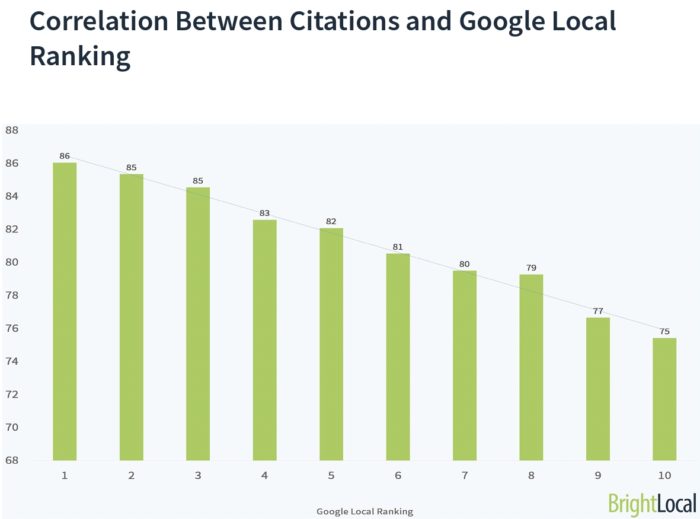
There are general categories of directories that your business can appear:
i). General listings: These are directories that serve all types of businesses. These listings are usually popular and have a huge user base.
Users in your locality can see your business on these platforms and get in touch to buy a property, sell a property, rent an apartment, or ask questions. Examples of such listings are Yelp, Foursquare, etc.
ii). Location-based listing: If there’s a local directory that lists the businesses in your city or state, you should have your business there as well. This will help you to rank for real estate keywords in your city.
iii). Profession-based listing: To give your real estate business more credibility, you need to add your business to real estate directories. This shows that your business is recognized by people in your industry. See the top 10 real estate directories based on traffic:
- RealEstate.com
- Zillow
- Trulia
- Yahoo! Homes
- Realtor.com
- Homes.com
- RedFin
- Frontdoor.com
- Century21 International
- Movoto.com
When a search engine user inputs a local query in the search box, Google checks through local business directories to gauge how authentic your business is. While adding your business to business listings, it’s important to keep these pieces of information in mind:

Consistent NAP: The name, address, and phone number of your business are its basic information. Before adding your business to directories, have a name, address, and phone number that you’ll use on all listings.
Encourage reviews: To serve as a social proof, reviews are one of the most effective tools. Tell your current customers to write honest reviews to various listings. Prospects can see reviews and make their decisions based on what your customers in the past say about you.Remember that 85% of consumers trust online reviews as much as personal recommendations.
Give feedback: When people review your business, you may need to reply in some cases. This is especially true if the review is negative or there was a complaint.
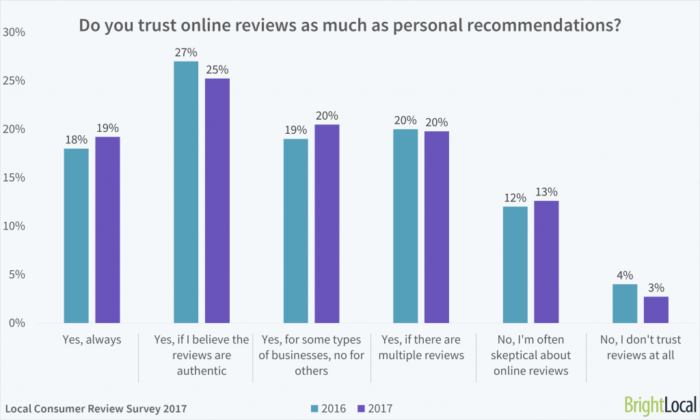
8. Make Your Website Mobile Responsive
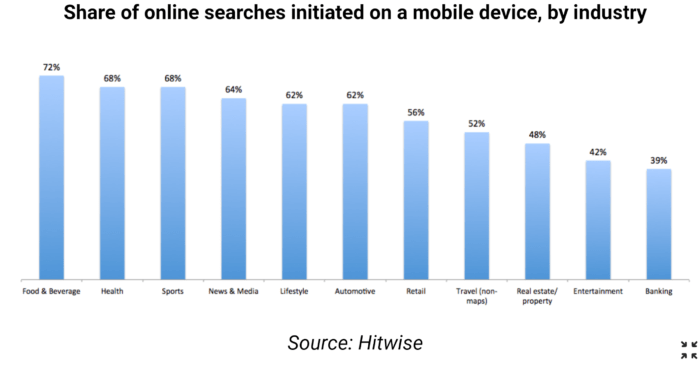
In recent years, mobile devices have surpassed desktop in the number of searches users perform. Mobile devices now account for about 60% of the searches on search engines.
If you’re serious about gaining local customers for your real estate business, your website needs to be attractive and usable on a mobile device. In fact, mobile is so important to search that Google began mobile-first indexing. This means Google will index the mobile version of your website before the desktop version.
If you have a website that doesn’t display well on mobile devices, this could affect your rankings for important keywords.
Making your website mobile responsive means visitors can enjoy the same views on both desktop and mobile devices. Your mobile website should have all the important elements available on the desktop version.
If you’re using WordPress for your real estate website, then you’ll find that most of the themes are responsive already.
If you already have a mobile-responsive website, then your website is good to go for mobile-first indexing.

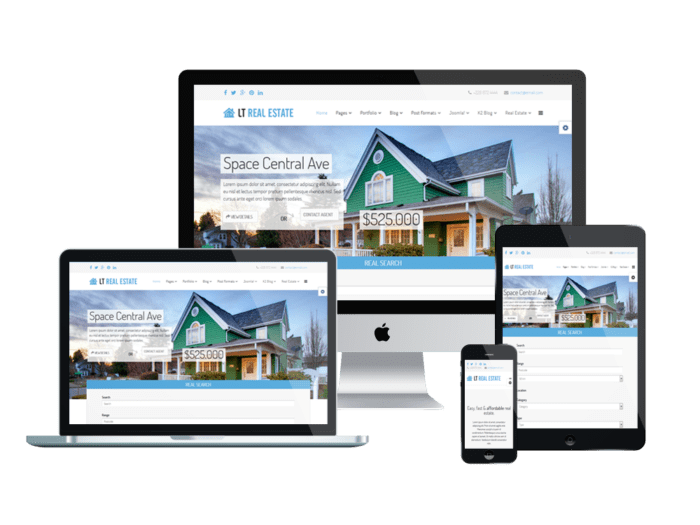
But what if your website is not responsive? How do you know it’s not? First of all, you can perform a Google Mobile-friendly test. The test will show you whether your website is mobile-friendly or not. Simply enter your site URL and click on “Run Test.”
If your site shows “not mobile-friendly” you can use the extra insights and suggestions to fix it quickly.
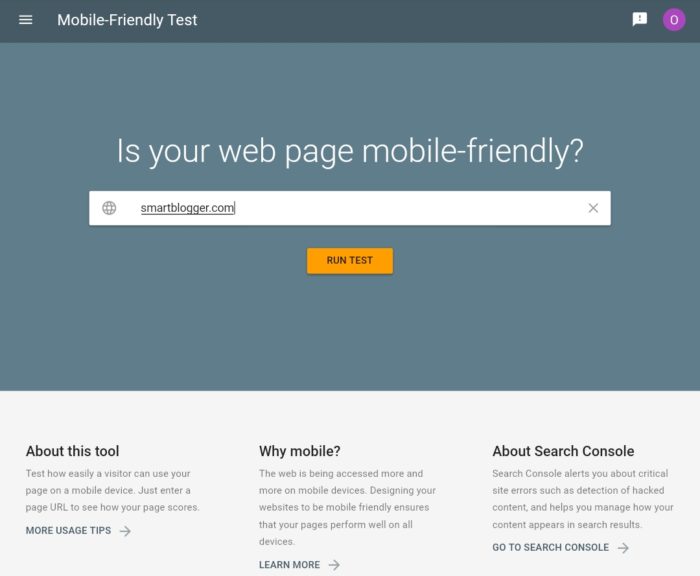
You’ll see the result after the test.
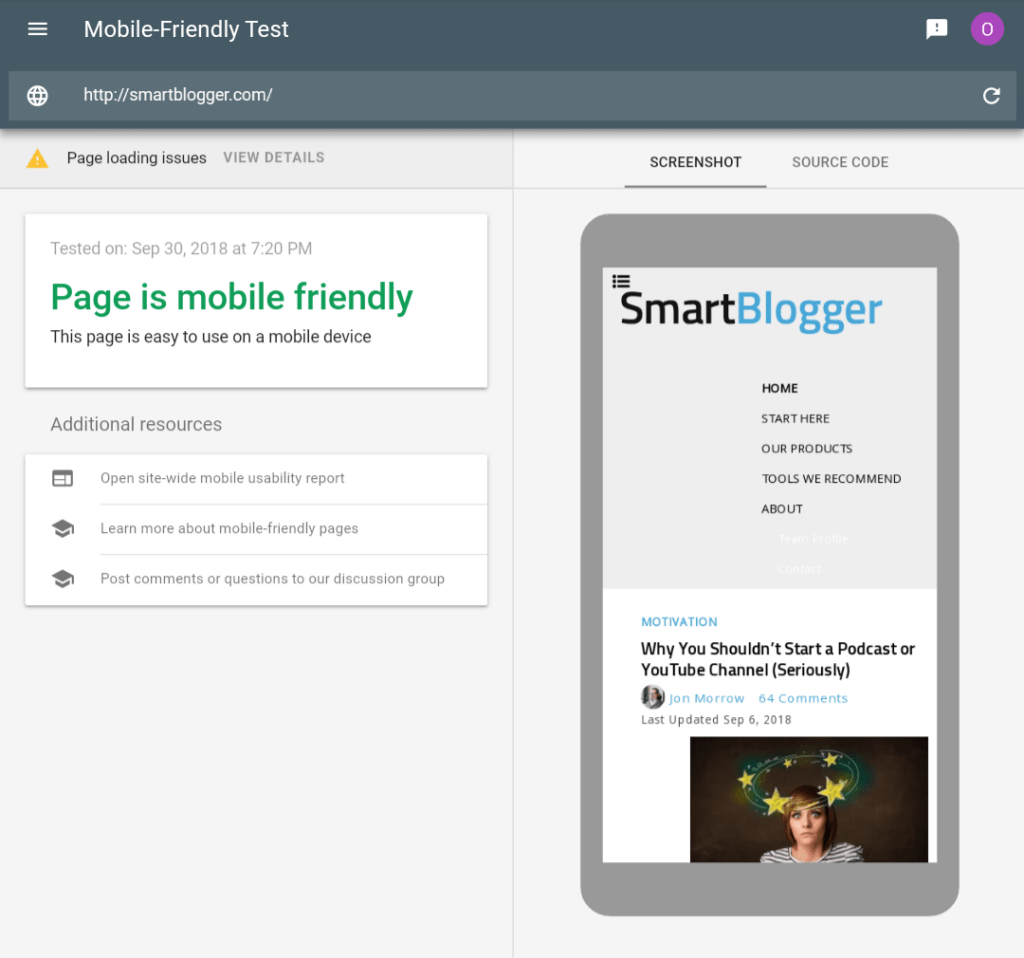
If there are load issues on your website, the results will show you. To check these issues, click on “View Details.”
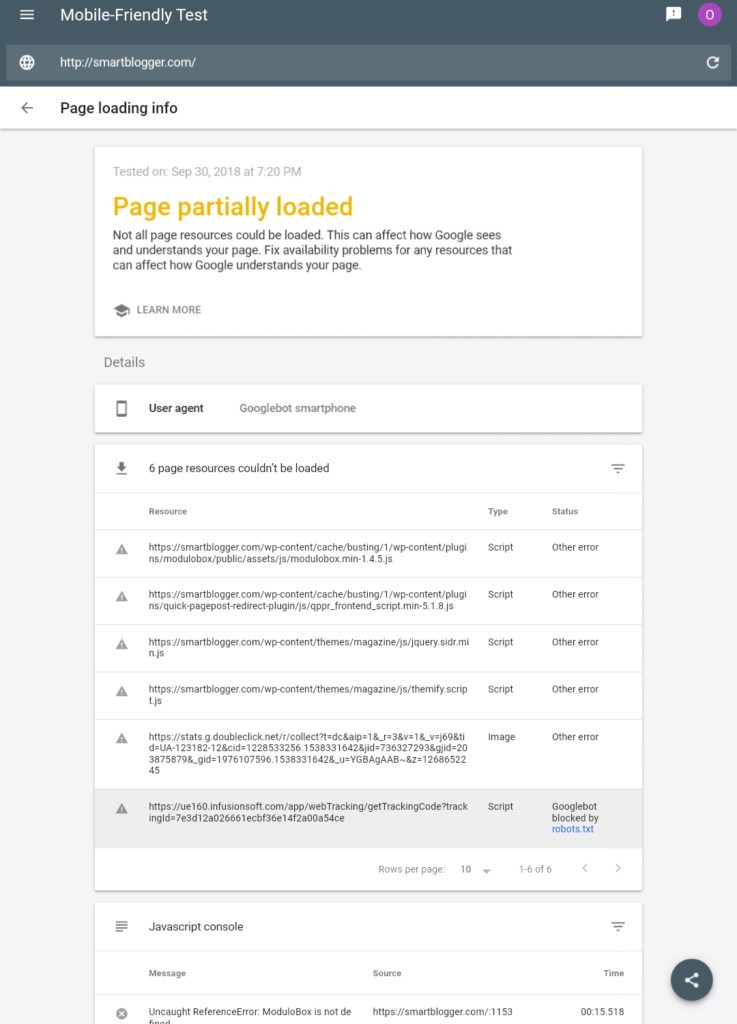
9. Improve Your Website Load Speed
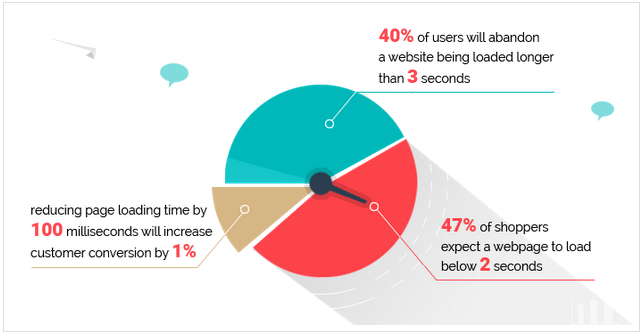
Due to the improvement in technology, visitors expect your website to be blazing fast. In fact, most visitors expect your webpage to load in less than 2 seconds. Otherwise, the majority of them will abandon your page.
If these visitors came from search engines, a high bounce rate is a negative signal. It means your website is not providing value for visitors. This will negatively affect your rankings.
Real estate businesses face a hurdle. Most of their websites are relatively slow. Why? Because of media content.
On your website, you have to post images of your properties and add videos that give people a virtual tour of your listing.
These media content can contribute to a heavy page size and slow your website down. To improve your website page speed, the first thing you need to know is its current speed. What’s your page size and how long does it load?
There are tools you can use to test your website speed. Some of these tools are Pingdom, GTMetrix, Google Page Speed Insights, etc. Pingdom is arguably the most popular speed test tool and I’ll show you how to use it here.
Go to the Pingdom website and click on “Tools.”
This will bring you to a page where you can enter your website address and select the server location where you’ll perform the test.
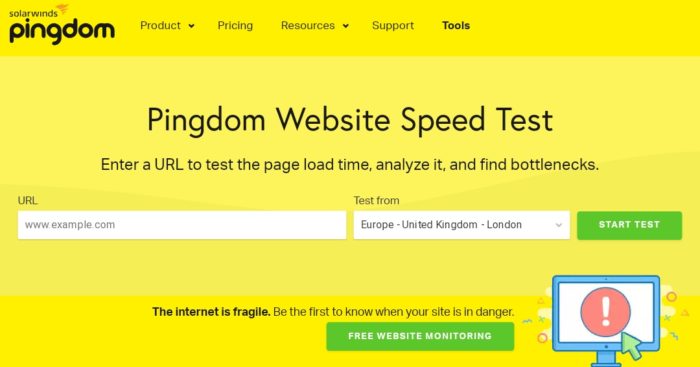
Pingdom offers you 7 servers in 5 continents where you can perform your test. These servers are in:
- Tokyo
- Frankfurt
- Washington DC
- San Francisco
- São Paulo
- Sydney
- London
When you’re performing a speed test for your website, it’s important to pick a server location that’s close to where your ideal visitors are. Pingdom will test from this location. This will show you how fast your page loads for your prospects and customers.
After entering your website address and picking a server, click on “Start Test.” The tool will show you your website performance grade, page load size, load time, number of requests.
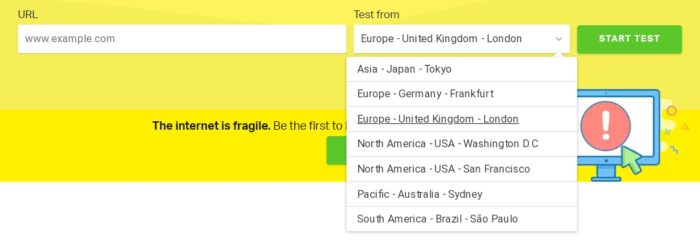
It will also show you a more detailed assessment of your website.
For every aspect, you’ll see a suggestion of what to do. You can use this as a checklist for the activities you need to perform to increase your page speed.
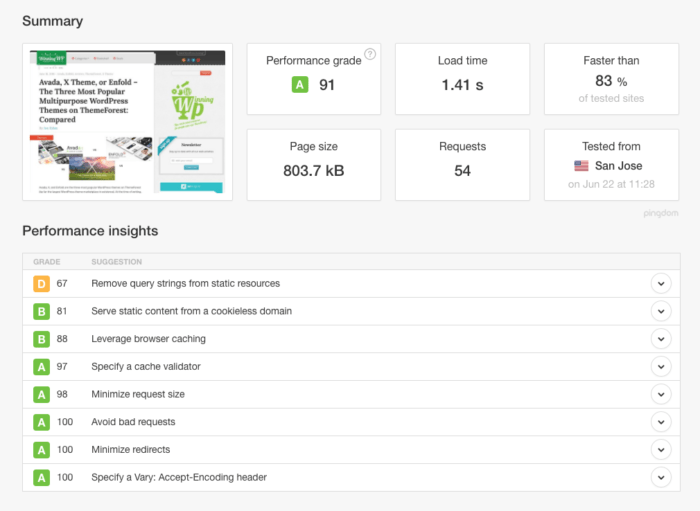
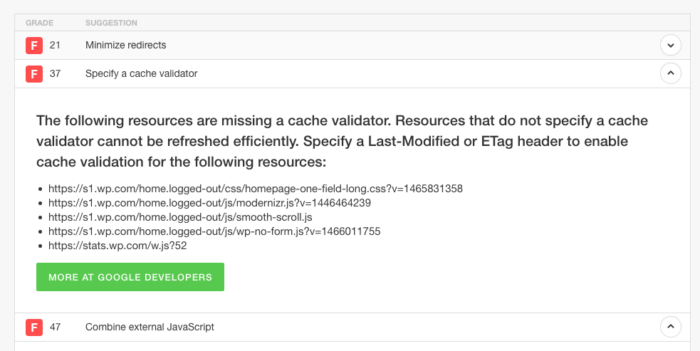
To increase your website page speed, some actions you can take are:
i). Use a content delivery network (CDN): This helps to host your images and videos rather than your website host.
ii). Compress images and videos: One way to reduce your page load time is to reduce the size of your page. When you compress images and videos before uploading them to your website, the web page size becomes smaller and the page loads faster for visitors.
iii). Use accelerated mobile pages (AMP): To ensure fast delivery of pages on mobile devices, Google introduced AMP for websites. With this, web pages can load from Google search in 0.5 seconds. This helps to reduce bounce rate. There are over 4 billion pages published currently on AMP.
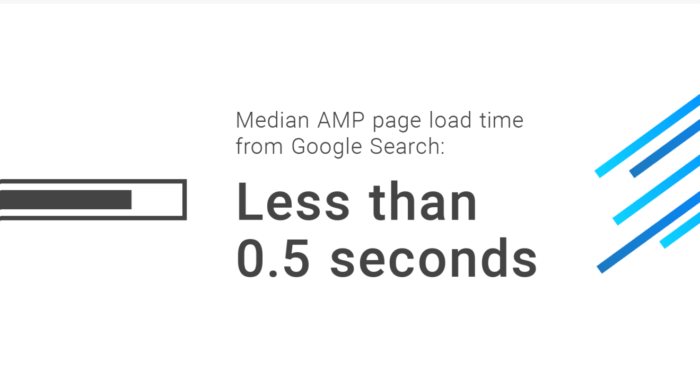
10. Add Schema Markups
Google search engine has evolved over the years. It now understands pretty much what’s on a web page. But this isn’t 100% accurate.
Four search engines (Google, Bing, Yahoo!, and Yandex) came together to initiate a markup language that offers important details about a page to search engines.
With schema markup language, you can add details like your business address, telephone number, opening hours, when a property will be opened, etc. below your search results.
One advantage that schema markup gives you over your competitors is that prospects looking to buy real estate property will be able to get more details about your business right on the search result.
For instance, seeing your address and telephone number means they can call you right away or visit your office to check your properties.
Also, implementing schema markup will help to improve your click-through rate (CTR) in the search results. This, in turn, is a positive signal to search engines and it leads to better rankings.
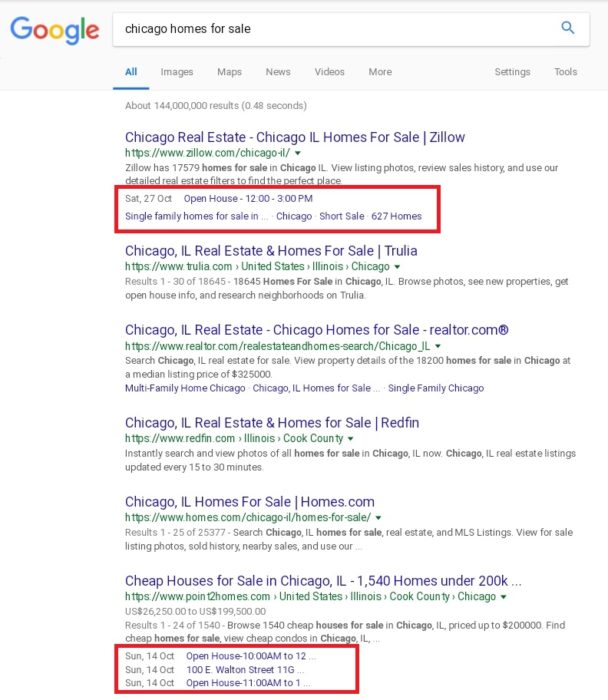
How do your implement schema markup for your real estate website?
1. You can use the Google Structured Data Markup Helper to markup a page with necessary information.

2. After entering your web page address, markup parts of your page with various information.
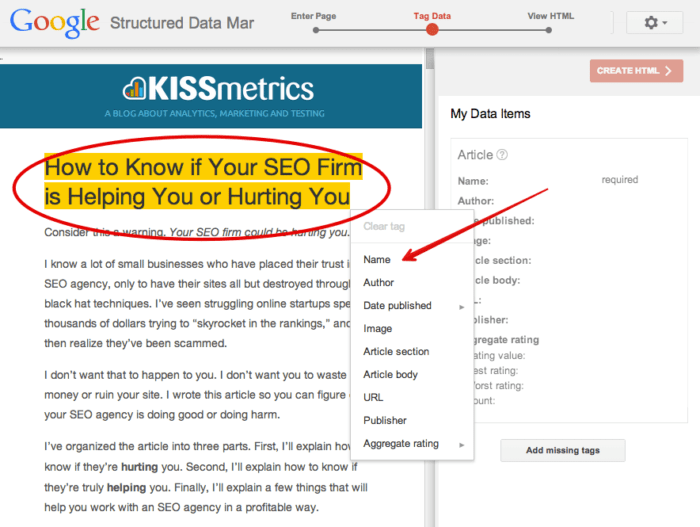
3. After that, create HTML of your page to markup the code.
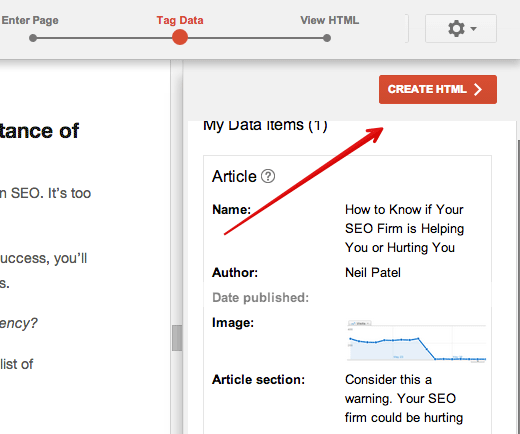
4. Copy the HTML code and replace it with the HTML code of the page.
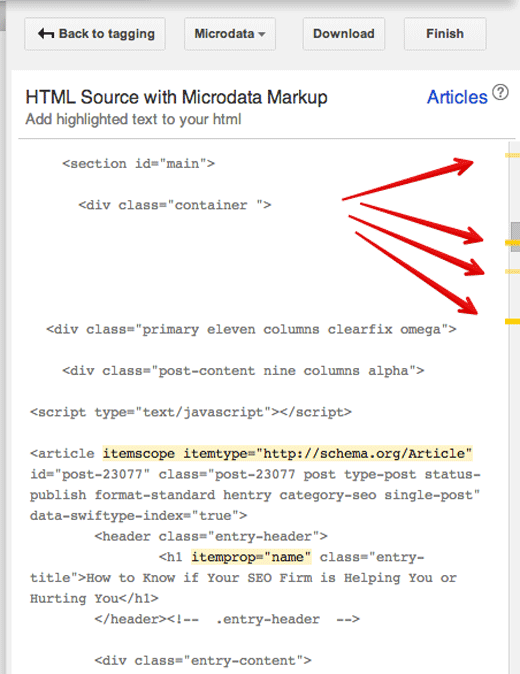
Conclusion
Getting your real estate website to rank for local keywords is one of the most important steps you can take online.
Potential home buyers and home sellers in your city, state, or country are searching for homes and appearing for these searches means you meet their needs.
Follow these proven guide and you’ll start attracting and converting potential clients who use Google to search for real estate agents, top realtors in U.S. and other related keywords.
Are you still confused, don’t know where to start? That’s why we’re here.
Scott KeeverSEO is a digital marketing firm specializing in real estate SEO. Let’s audit your real estate website, develop a strategy that will grow your leads and revenue. Get a free consultation now.

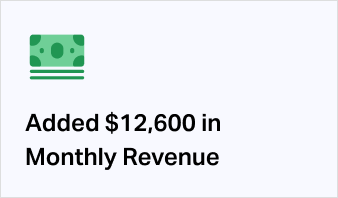
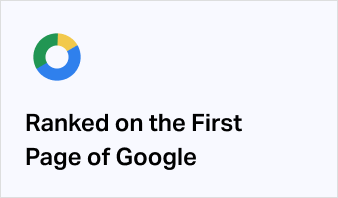
Related Posts

Lawn Care SEO: How to Generate Leads and Landscaping Clients Fast
As a lawn care and landscaping specialist, your work makes homes more beautiful…..

Real Estate Seo
The Step-By-Step Guide To Real Estate SEO By KeeverSEO Team3 August 2023 . 2 min read Share this post Request

Roofing SEO Marketing: The Simple Guide to Getting Leads from Google
Are you willing to implement simple techniques to attract people searching…..







